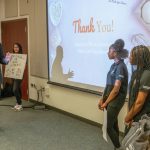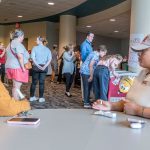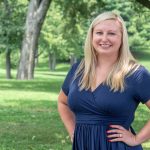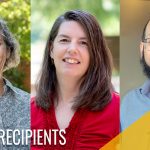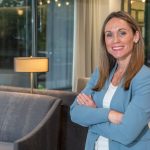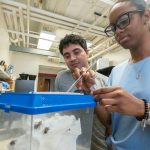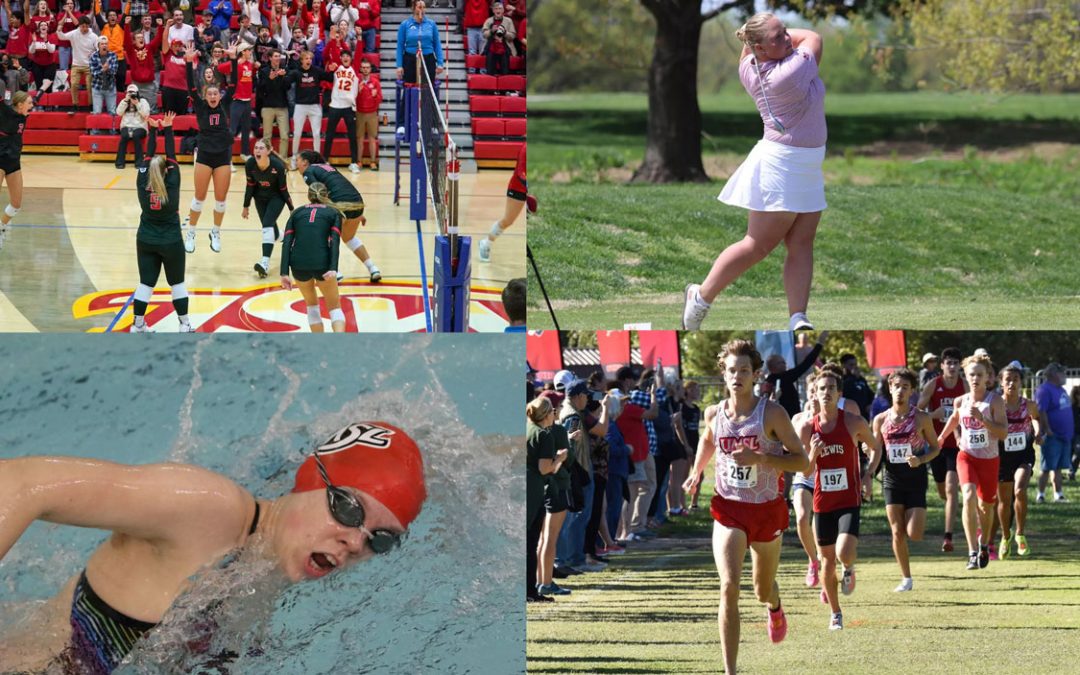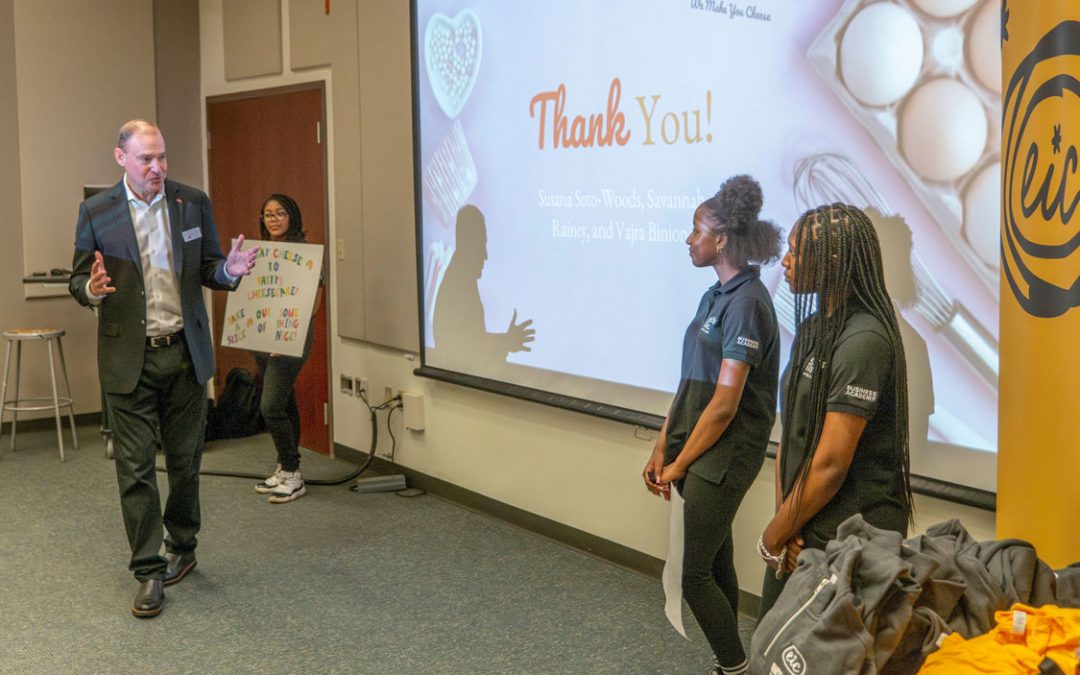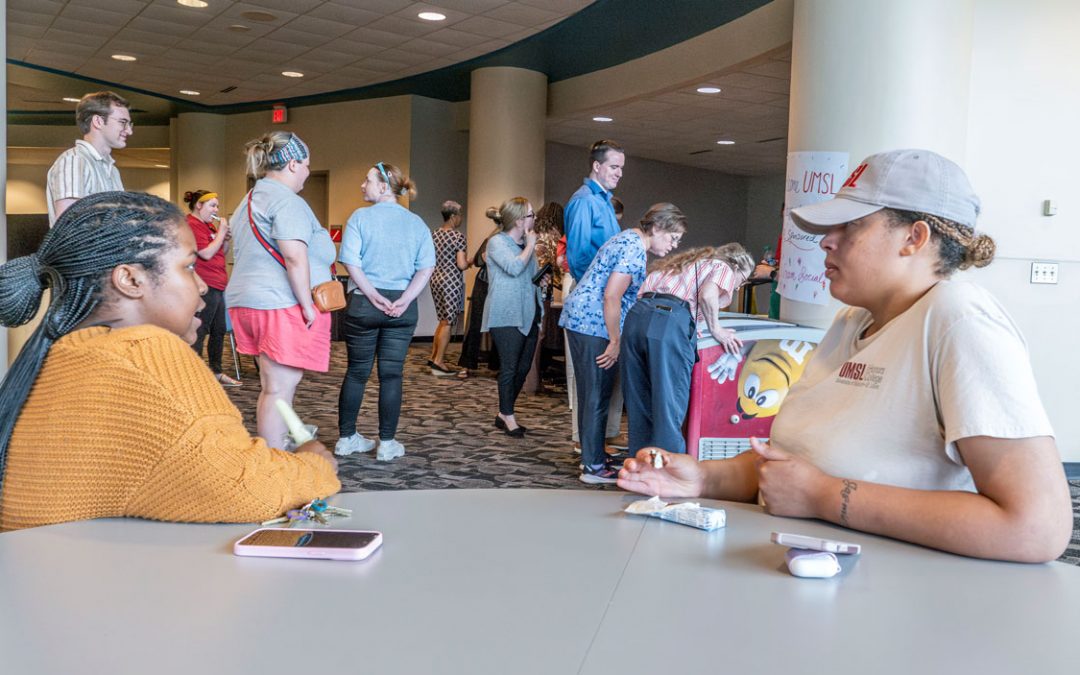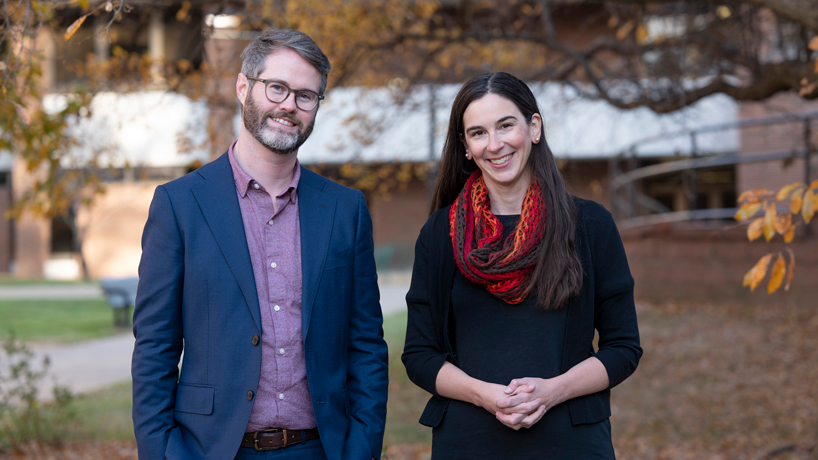
Paul Sorenson (left) and Kiley Bednar have been tapped to serve as co-directors of UMSL’s Community Innovation and Action Center. (Photo by August Jennewein)
The Community Innovation and Action Center at the University of Missouri–St. Louis was created to be a facilitator of collaboration between community partners looking to address large-scale challenges in the St. Louis region.
It’s fitting then that the center is adopting a collaborative leadership model with Kiley Bednar and Paul Sorenson being tapped to serve as its co-directors. They’ll work together to try to grow its reach and impact while building on the foundation laid by its late founding director, Paul Evensen, who died in June.
“The University of Missouri–St. Louis is committed to helping build inclusive prosperity throughout our region, and it takes collective action to achieve that goal,” said Chris Spilling, UMSL’s vice chancellor for research and economic and community development. “The Community Innovation and Action Center serves an important role, building responsive applied research and partnership capacity that connects the university with the priorities of our community partners. We are excited to have the leadership of Kiley and Paul to guide these collaborative efforts.”
Sorenson has been part of CIAC’s staff since the center’s formation in 2018, when it merged the legacy of the Public Policy Research Center as a leading source of applied policy research in St. Louis with the work of Social Innovation STL, a nonprofit founded by Evensen to forge innovative programs, organizations and collective efforts to tackle challenges throughout the region.
Since joining the center as an associate director, Sorenson has been instrumental in the formation of the St. Louis Regional Data Alliance, with its mission to build shared data infrastructure that supports individuals and organizations doing community-focused work throughout the area. He helped build the Regional Data Exchange, an online portal that brings together more than 420 local public datasets into one easy-to-access location.
Bednar brought with her a background supporting youth initiatives, first in Chicago and then nationally, when she came to CIAC to serve as an associate director in February of 2019.
Among other projects, Bednar helped develop an early childhood needs assessment for the state of Missouri on behalf of the Department of Elementary and Secondary Education.
“They’re in the business of creating community partnerships and collaborations that involve UMSL,” said Adriano Udani, an associate professor of political science, who serves as CIAC’s research advisor. “This work is really difficult, and you’re lucky to have one person, but the fact that we have two great people like Paul and Kiley that bring a mix of relationships with different communities as well as with different stakeholders in the area is really to UMSL’s benefit.
“They have such a great mix of leadership qualities, which they constantly employ to focus on equity. They work well with each other. They hold each other accountable, and they also have the same shared vision of what mutually beneficial community partnerships look like.”
Both Sorenson and Bednar worked alongside Evensen and share his ambition for the center to serve as a convener, helping local nonprofits and local governments more effectively leverage university resources.
“We are hoping to elevate and connect a lot of the critical, community-based work that UMSL faculty and staff are already engaged in, particularly in this applied research space,” Sorenson said. “How can the knowledge that the university has really be applied in the community? How can it be used to support change in real time in partnership with people doing the work on the ground every day? We know this is deeply aligned with the university’s mission and are very thankful for the leadership of Chancellor Sobolik and Vice Chancellor Spilling in recognizing the role of CIAC as a coordinating body.”
Other organizations are invested in the work of the center.
The Missouri Foundation for Health recently awarded it another $246,000 grant to continue work of the St. Louis Regional Data Alliance with a particular focus on data governance, community engagement and racial equity while building a more connected and equitable data ecosystem in St. Louis. The Regional Data Alliance has also started working with Rise Community Development to provide ongoing support for Rise’s focus on data-informed neighborhood projects in partnership with UMSL’s Geospatial Collaborative.
CIAC is slated to receive more than $500,000 as one of six partners in the St. Louis region working on Centers for Disease Control and Prevention grant to boost efforts to combat COVID-19, including hiring and training 10 more community health workers.
“There are two components to the work,” Bednar said. “The first component is specifically focused on addressing gaps in terms of access for COVID vaccines and COVID testing. The focus will be to train community health workers on COVID response efforts to then support a kind of full on public health response – focusing on faith communities, focusing on community-based delivery services and creating satellite hubs – one in the city, one in the county – that can be a resource for communities.”
As the second component, CIAC will also be supporting evaluation of the project.
Bednar and Sorenson are both involved in an emerging partnership CIAC started with Children’s Funding Project to support strategic financing for child and youth services with fiscal mapping and strategic finance analysis. Children’s Funding Project is a nonprofit organization that helps communities and states expand equitable opportunities for children and youth through strategic public financing.
Sorenson and Bednar have plans to hire additional staff in early 2022 to support these efforts.
They also continue to support the St. Louis Coro Fellows Program, which began training its first cohort of fellows last November since relaunching at UMSL after a two-year hiatus. The program provides experiential leadership development training to a new generation of civic-minded individuals.




